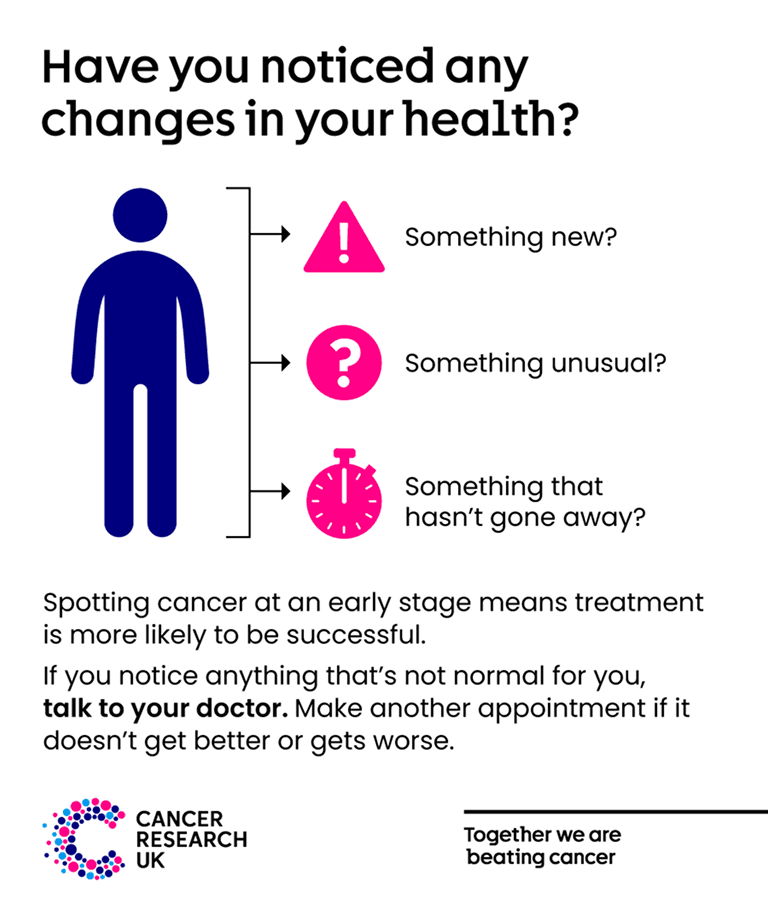Spot cancer early
It’s important to be body aware. This means knowing what your body usually looks and feels like. This makes it easier to spot any changes that aren’t normal for you.
But being body aware is different from doing ‘self-examinations.’ Lots of people talk about doing self-examinations (also known as self-checks or self-exams) at home, to try and spot cancer early. This involves regularly checking at a set time each, day, week or month, in a very specific way like using certain hand positions or movements.
But there’s no good evidence that doing this kind of regular self-checking is helpful. We have not seen improved cancer survival in people who self-check regularly.It can even do more harm than good. It can pick up things that wouldn’t have gone on to cause problems and lead to unnecessary tests, treatment and worry.
So there is no need to do strict routine self-checks. Instead, be aware of what is normal for you and talk to your doctor if something isn’t quite right.
“The advice now is not to be fixated on checking on a regular basis – unless you’ve been told to do so by a healthcare professional.”
“You should be body aware, which means you should be aware, from a young age, of your body appearance and what the feel of your body is, and then you have a good baseline of normality for you.” - Dr Ameesh Patel, North East London GP and Havering North Primary Care Network Cancer Lead.
There are over 200 different types of cancer with lots of possible signs and symptoms. You wouldn’t be able to remember them all. Some signs are visible, like unusual lumps or bleeding. Other symptoms you can’t see or touch such as feeling more tired than usual or breathlessness.
But it’s not your job to know what’s wrong or if you have cancer. The best thing you can do is listen to your body and tell your doctor if something doesn’t look or feel quite right. Even if you don’t think your symptoms are serious, they’ll want to hear from you, and you won’t be wasting their time. They can give you advice and arrange any tests you might need. In most cases it won’t be cancer but, if it is, spotting it early can make a real difference.

It is good to be breast aware. That means knowing what your breasts or chest usually look and feel like, so you know what’s normal for you. This includes knowing what your breasts are like at different times of the month. Being breast aware isn’t just about lumps. It’s important to be aware of any unusual changes to the look or feel of your breasts or chest. You can read more about how to be breast aware, on our finding breast cancer early webpage.
Breast self-examinations (also known as breast ‘self-checks’) involve following a set routine. This could be when or how to check. But you do not need to do breast or chest self-examinations at a set time or in a set way to look for breast cancer. Research has shown that women who self-examine their breasts aren’t any less likely to die from breast cancer. But they are almost twice as likely to have an unnecessary test (biopsy) on a lump that turns out not to be cancer.
Instead, have a look and feel of your breasts or chest, so you know what’s normal for your own body. You can do this in a way that feels comfortable for you. This includes the area up to the collarbone and into the armpit. This will make it easier to notice any unusual lumps or other changes to your chest, breasts or nipples that aren’t normal for you. And if something’s not quite right (no matter how you find it), get it checked out.
You can find out more about breast changes to look out for on our breast cancer symptoms page.
It’s a good idea to know what your testicles usually look and feel like, and to be aware of their normal size and weight. This can make it easier to spot unusual changes, which you should always tell your doctor about.
But there’s no need to regularly self-check at a set time or in a set way, as there is a lack of evidence showing a benefit to testicular self-checking.
Remember, it’s still important to listen to your body and tell your doctor if you’ve noticed any unusual lumps, swellings or other changes to your testicles that aren’t normal for you. If something’s not quite right (no matter how you find it), get it checked out.
You can find out more on our webpage about finding testicular cancer early and when to see your doctor.
Last reviewed: 25 Jun 2025
Next review due: 25 Jun 2028
Questions about cancer? Call freephone 0808 800 40 40 from 9 to 5 - Monday to Friday. Alternatively, you can email us.